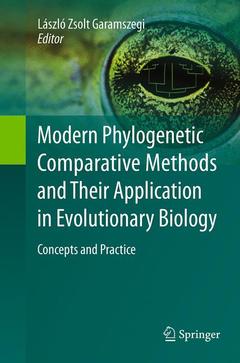Description
Modern Phylogenetic Comparative Methods and Their Application in Evolutionary Biology, 2014
Concepts and Practice
Coordinator: Garamszegi László Zsolt
Language: English
Subjects for Modern Phylogenetic Comparative Methods and Their...:
Publication date: 09-2016
Support: Print on demand
Publication date: 08-2014
552 p. · 15.5x23.5 cm · Hardback
Description
/li>Contents
/li>Biography
/li>Comment
/li>
Phylogenetic comparative approaches are powerful analytical tools for making evolutionary inferences from interspecific data and phylogenies. The phylogenetic toolkit available to evolutionary biologists is currently growing at an incredible speed, but most methodological papers are published in the specialized statistical literature and many are incomprehensible for the user community. This textbook provides an overview of several newly developed phylogenetic comparative methods that allow to investigate a broad array of questions on how phenotypic characters evolve along the branches of phylogeny and how such mechanisms shape complex animal communities and interspecific interactions. The individual chapters were written by the leading experts in the field and using a language that is accessible for practicing evolutionary biologists. The authors carefully explain the philosophy behind different methodologies and provide pointers ? mostly using a dynamically developing online interface ? on how these methods can be implemented in practice. These ?conceptual? and ?practical? materials are essential for expanding the qualification of both students and scientists, but also offer a valuable resource for educators. Another value of the book are the accompanying online resources (available at: http://www.mpcm-evolution.com), where the authors post and permanently update practical materials to help embed methods into practice.
László Zsolt Garamszegi is an Associate Professor at Estación Biológica de Doñana in Seville, Spain. His research focuses on various questions in evolutionary biology, with major interests in the evolution of behaviours, sexual signals and animal communication as well as host-parasite interactions. In all of these lines of investigations, Dr. Garamszegi heavily relies on the application and development of statistical approaches, in which he has obtained a considerable expertise. As a result, he plays a leading role in the dissemination of various tools for data analysis within the disciplines of evolutionary biology and behavioural ecology, which is clearly indicated by the number of methodological papers, journal volumes and conferences to which he contributed.
Helps to integrate of the rapidly developing statistical methodology into evolutionary biology
Provides an overview of the most recent phylogenetic comparative methods that have been developed for a diverse array of questions
The conceptual background is presented with an extensive list of biological examples and illustrative analyses
Includes supplementary material: sn.pub/extras
These books may interest you

The Tree of Life 109.06 €



